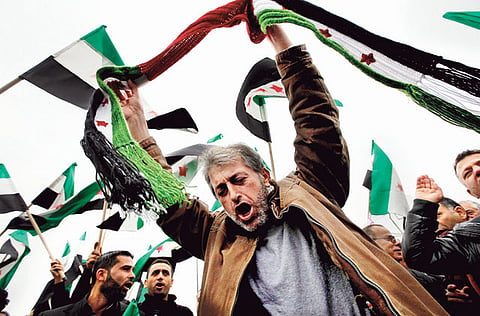Cherish the value of public dialogue
The upheaval seen in many Mideast countries can be linked to the feeling from some citizens that they can't speak freely about important topics

History shows us that public dialogue is largely beneficial for societies. Public dialogues — discussions that occur in a public venue as opposed to a private setting — are essential to creating healthy, engaged citizenry.
These public discussions can take place in a room with an audience, through mass media outlets such as television or newspapers, or through the internet and social media.
When people speak publicly about their opinions, experiences and beliefs, their thoughts can never be covered up again. They enter the sphere of public domain and no longer belong to the speaker. Their words could have a huge effect and change the direction of entire society or they could be heard and immediately forgotten by an unmoved audience.
Ideally, the audience hears their words, thinks about them, modifies their own views, and understands the speaker’s position a little better. A response may reflect the newfound insight gained from listening and the process can repeat itself until a consensus of agreement can be built. The philosopher Frederich Hegel noted that all history appears to move in this fashion with slow incremental change that, more often than not, shifts toward the overall benefit of everyone in society.
Great social change often takes place under the auspices of public dialogue. While we remember the words and actions of great men and women such as Martin Luther King Jr. or Mahatma Gandhi, the real change in opinion took place in the public conversations forced by their actions. The discussions we hear as people publicly state and defend their opinions often shape our own beliefs.
Public dialogues can also heal societal wounds. After 11 years of civil war in Sierra Leone, the West African nation launched a “Truth and Reconciliation Commission.” In a series of public events — broadcast throughout the country — civilian victims described the terrible crimes endured during the war.
The process proved cathartic for many as private horrors were stated publicly, never to be forgotten. The public disclosure prompted the society to accept this history and move forward with forgiveness and reconciliation. Today, Sierra Leone is a functioning democracy noted for its high level of cultural and religious tolerance.
In all societies, many impediments to public dialogue exist. A German academic, Jurgen Habermas, identified four conditions required to create an ideal environment for public dialogue.
First, he said, everyone who would like to participate in a dialogue should have the ability to engage. Second, participants in a dialogue must be able to respond and challenge the validity of each other’s statements.
Third, all speakers in a public dialogue must agree to speak truthfully and make their inner motivations transparent. Finally, no speakers can be coerced —internally or externally — from adhering to the other three conditions.
After formulating these lofty ideals for public dialogue, Habermas went on to say that such an environment rarely exists. In many nations, the advent of the mass media and commercialised culture has particularly hampered the ability for genuine public dialogue. And governments or cultures that place restrictions on speech create ‘internal and external’ coercion, a violation of the fourth condition.
Still, Habermas’ work on the makeup of ideal speech environments helps us identify the impediments to public dialogue in any society.
Public dialogues in the Arab world are vital during this time of change. Many important issues require discussion. The upheaval seen in many Middle East countries can be linked to the feeling from some citizens that they couldn’t speak freely about important topics such as the relationship of the government to the governed, the role of women in society, or the deteriorating economy and crippling lack of jobs.
In order for societies to thrive, we must work to cherish public dialogue and help to encourage ideal speech conditions.
Governments should not take actions that could cause speakers to avoid engaging in public dialogue. Arresting people for the things they’ve said or written invariably has a dampening effect on public speech. Yes, some limits are required. But, restrictions should focus on speech that calls for violence — which, of course, has nothing to do with healthy dialogue.
Discussions must also remain civil. Many animated discussions are taking place on Twitter, an environment that appears to meet many of Habermas’ requirements for ideal speech. However, one complaint among the local Twitter community is that people who disagree with other viewpoints often accuse them of being “traitors.” Death threats have also been lobbed. These types of responses create an ‘external coercion’ that impedes healthy public dialogue.
Blasphemy laws also have an unintended effect of stifling public discussion. Take, for instance, the recent case of Hamza Kashgari, the Saudi journalist (currently under arrest and facing the death penalty) who tweeted words offensive to many Muslims.
The Grand Mufti of Egypt recently commented on the case by saying: “We don’t kill our sons, we talk to them.” His words offer powerful support for the benefit of public dialogue — even in matters concerning religion.
Despite these impediments, technological advances appear to be helping create more healthy public dialogues. Vibrant discussions on Twitter, Facebook and other social media platforms are raising issues in the public sphere that once would have gone unspoken beyond private settings. Engaging in dialogue can be a learning process and social media is providing a good platform for this education.
Hopefully, the Middle East will continue to move toward more acceptance of public dialogue. After all, today’s public discussion could alleviate tomorrow’s public unrest.
Dr Matt J. Duffy is a professor of communication at Zayed University
in Abu Dhabi. You can follow him on Twitter at www.twitter.com/mattjduffy
A version of this column will be delivered today at the BoldTalks event at the Dubai Community Theatre and Arts Centre.



